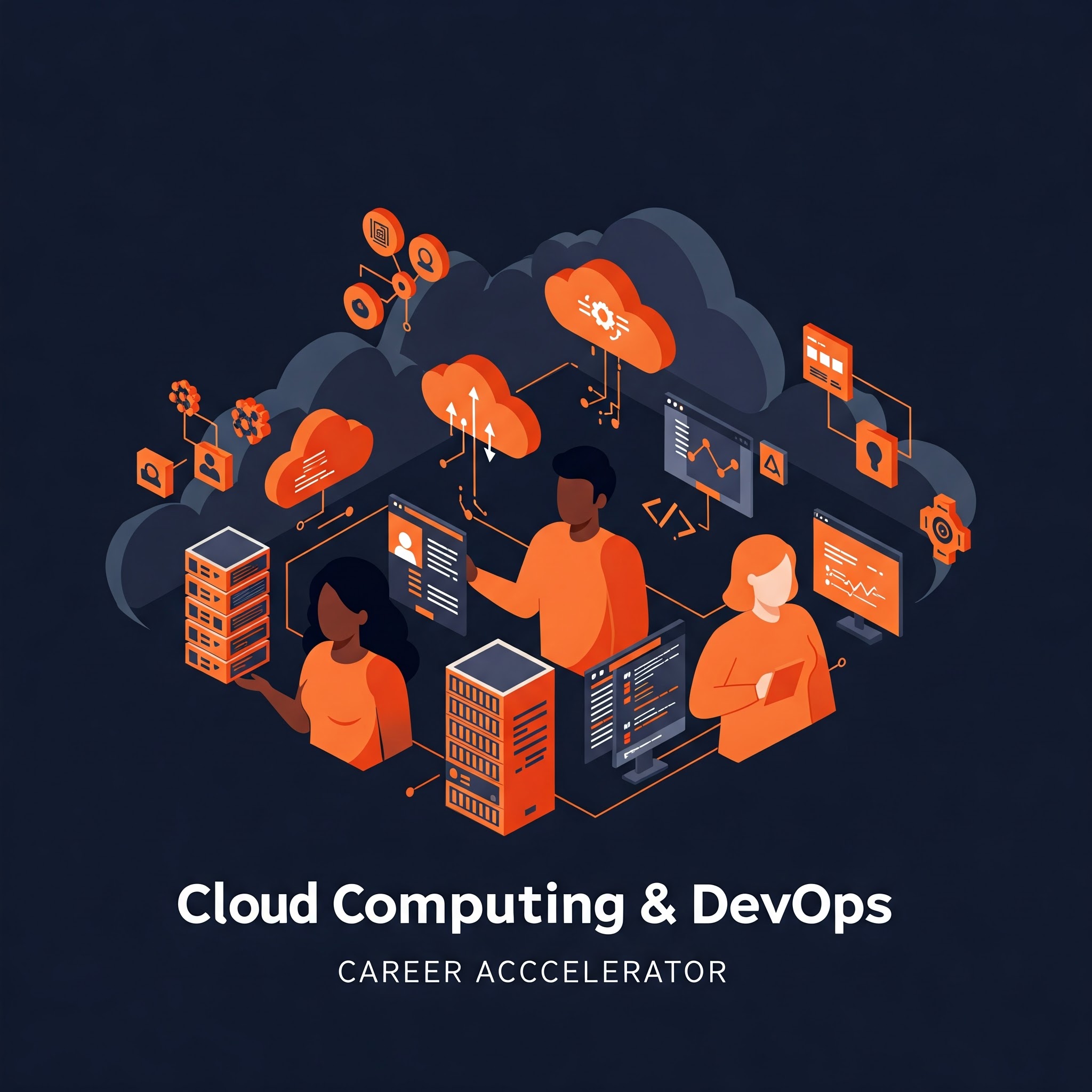Welcome To
Our FREE Cloud Computing & DevOps Career Accelerator
Launch your cloud career with this free 24-week Cloud Computing and DevOps curriculum! Designed for job readiness, this hands-on program teaches you to deploy scalable infrastructure on AWS, Azure, and GCP**, automate workflows with Terraform and Kubernetes, and build CI/CD pipelines using Jenkins and GitHub Actions
v
Enroll Now: Redefine creativity with living materials—launch a career merging art, science, and sustainability!
iT’S FREE
🎯 Target Roles
- Cloud Administrator • DevOps Engineer • Site Reliability Engineer (SRE)
- Infrastructure Specialist • Junior Cloud Architect • CI/CD Automation Specialist
💼 Built-In Benefits (Same as before)
Recognized for excellence in e-learning.
- ✅ Internship Simulations
- ✅ Cert-Aligned Labs
- ✅ Peer Review Forums
- ✅ Resume + Portfolio Support
- ✅ Mock Interviews
- ✅ DevOps Challenges
- ✅ Full Capstone Deployment
🧱 Program Structure
Track → Stages → Chapters → Lessons
Here’s the full curriculum restructured with chapters and lessons under each stage, keeping the original benefits, certifications, and program intent intact.
🔹 Stage 1 – Foundations: Linux, Networking & Cloud Core
Chapter 1.1: Linux for Cloud Professionals
- 1.1.1 – Linux CLI & Permissions
- 1.1.2 – Package Management & Services
- 1.1.3 – Bash Scripting Basics
- 1.1.4 – SSH, rsync, and Remote Access
Chapter 1.2: Networking Fundamentals
- 1.2.1 – TCP/IP, DNS, Firewalls
- 1.2.2 – NAT, Subnetting, and Routing
- 1.2.3 – Tools: netstat, nmap, traceroute
- 1.2.4 – Port Exposure & Zero Trust Mindset
Chapter 1.3: Intro to Cloud Platforms
- 1.3.1 – Cloud Concepts: IaaS, PaaS, SaaS
- 1.3.2 – Shared Responsibility Model
- 1.3.3 – AWS vs Azure vs GCP Overview
- 1.3.4 – Free Tier Setup & CLI Tools
🔹 Stage 2 – Cloud Platform Mastery (AWS, Azure, GCP)
Chapter 2.1: AWS Fundamentals
- 2.1.1 – IAM & S3 Bucket Hardening
- 2.1.2 – EC2 Instances & Key Pairs
- 2.1.3 – CloudTrail & Billing Alerts
- 2.1.4 – Real-World Misconfigs + Lab
Chapter 2.2: Azure Fundamentals
- 2.2.1 – RBAC & Identity Control
- 2.2.2 – Azure Resource Groups & VMs
- 2.2.3 – Azure Monitor & Network Watcher
- 2.2.4 – Azure CLI & Defender Lab
Chapter 2.3: GCP Crash Course
- 2.3.1 – IAM & Service Accounts
- 2.3.2 – Cloud Storage + VPC Configuration
- 2.3.3 – Stackdriver Logging & Alerts
- 2.3.4 – GCP Cost Control & Labs
🔹 Stage 3 – DevOps Essentials: Git, CI/CD, Containers
Chapter 3.1: Git & Version Control
- 3.1.1 – Git CLI Basics + GitHub Workflow
- 3.1.2 – Branching Strategies + .gitignore
- 3.1.3 – GitHub Actions for Beginners
- 3.1.4 – Git Repos in DevOps Pipelines
Chapter 3.2: Containers (Docker)
- 3.2.1 – Intro to Docker Images, Volumes, Networks
- 3.2.2 – Dockerfile Best Practices
- 3.2.3 – Running Multi-Container Apps
- 3.2.4 – Docker Compose & Port Mapping Labs
Chapter 3.3: CI/CD Principles
- 3.3.1 – CI vs CD: Pipeline Mindset
- 3.3.2 – GitHub Actions, Jenkins, GitLab CI
- 3.3.3 – Deploy on Push, Testing Phases
- 3.3.4 – Break/Fix CI/CD Simulation
🔹 Stage 4 – Infrastructure Automation & Provisioning
Chapter 4.1: Terraform IAC
- 4.1.1 – Terraform Init, Plan, Apply
- 4.1.2 – Providers, Modules & State
- 4.1.3 – AWS + Azure Resource Creation
- 4.1.4 – CI/CD + Terraform Workflow
Chapter 4.2: Configuration Management
- 4.2.1 – Ansible vs Shell Scripting
- 4.2.2 – Playbooks & Inventory
- 4.2.3 – Common Roles: NGINX, Docker, Users
- 4.2.4 – Ansible + AWS Integration
Chapter 4.3: DevSecOps Foundations
- 4.3.1 – Integrating Security into CI/CD (SAST, DAST basics)
- 4.3.2 – Secrets Management (Vault, AWS Secrets Manager, Azure Key Vault)
- 4.3.3 – Compliance & Governance (GDPR, HIPAA, SOC2 overview)
- 4.3.4 – Hands-On Lab: Secure a CI/CD pipeline with secrets + scanning
Chapter 4.4: Kubernetes Basics
- 4.4.1 – Kubernetes Architecture & Core Concepts
- 4.4.2 – kubectl & Cluster Setup
- 4.4.3 – Deployments & Services
- 4.4.4 – ConfigMaps, Secrets & Volumes
- 4.4.5 – Helm & Package Management (Optional Advanced)
Chapter 4.5: Serverless Functions
- 4.5.1 – Introduction to Serverless Computing
- 4.5.2 – AWS Lambda Basics
- 4.5.3 – Azure Functions & Event-Driven Workflows
- 4.5.4 – Google Cloud Functions & Pub/Sub
- 4.5.5 – Serverless CI/CD & Real-World Use Cases
Chapter 4.6: FinOps & Cost Optimization
- 4.6.1 – Introduction to FinOps Principles
- 4.6.2 – Cloud Billing & Cost Visibility
- 4.6.3 – Rightsizing & Resource Optimization
- 4.6.4 – Budgeting, Forecasting & Alerts
- 4.6.5 – Advanced FinOps Practices & Culture
🔹 Stage 5 – Monitoring, Observability & Incident Response
Chapter 5.1: Logging & Alerting
- 5.1.1 – Log Pipeline Design (Elastic, Loki)
- 5.1.2 – Syslog, CloudWatch, FluentD
- 5.1.3 – Parsing Logs with Logstash & Regex
- 5.1.4 – Alert Conditions & Action Groups
Chapter 5.2: Monitoring & Metrics
- 5.2.1 – Prometheus: Metric Scraping
- 5.2.2 – Grafana Dashboards
- 5.2.3 – Health Checks & Exporters
- 5.2.4 – AlertManager & Incident Response
🔹 Stage 6 – Capstone, Portfolio & Job Preparation
Chapter 6.1: DevOps Capstone Challenge
- 6.1.1 – Build a Full CI/CD Pipeline to Cloud
- 6.1.2 – Infra with Terraform + Ansible
- 6.1.3 – Logs to ELK + Monitoring Dashboards
- 6.1.4 – Submit IR Report + Video Walkthrough
Chapter 6.2: Resume + LinkedIn + GitHub
- 6.2.1 – Translating Labs into Résumé Bullets
- 6.2.2 – LinkedIn Headline & Summary for DevOps
- 6.2.3 – Structuring a GitHub Portfolio (repos, READMEs, CI/CD badges)
- 6.2.4 – Publishing Case Studies on LinkedIn/Medium
- 6.2.5 – Adding Dashboards & Terraform Repos to Portfolio
Chapter 6.3: Teamwork & Agile in DevOps
- 6.3.1 – Agile & Scrum Basics for DevOps Teams
- 6.3.2 – Collaboration Tools (Jira, Confluence, Slack integrations)
- 6.3.3 – Writing & Running Postmortems (incident communication)
- 6.3.4 – Peer Review Simulation
Chapter 6.4: Mock Interviews + Career Launch
- 6.4.1 – Tier 1 Cloud + DevOps Interview Sim
- 6.4.2 – Final Job Plan Tracker + Accountability
- 6.4.3 – Free Certifications & CareerDispatch.com Certificate of Completion


